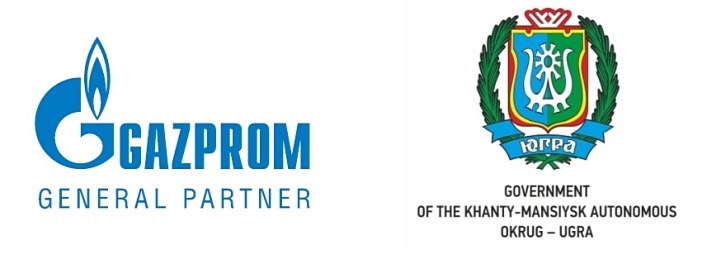Russia beats the USA, moves into the final
India is the last obstacle between Russia and the gold medal. Russia has not won a Chess Olympiad since 2002. The final will take place tomorrow Sunday, August 30, at 11:00 UTC (14:00 in Moscow, 16:30 in Delhi).
Russia moves into the final of the first Online Chess Olympiad, after a very tight match against the USA. The Russian team won the first round by minimal margin (3½-2½), then drew the second match (3-3) to seal their pass to the final. In general, Russia seemed to have the match situation under control for most of the time, but both matches could have gone either way in the time scrambles, as the narrow score shows.
The first match was decided by the results among the female players, where all three games reached a decisive outcome. Aleksandra Goryachkina played aggressively with White against Anna Zatonskih, castling long and launching a pawn onslaught on the kingside. At the right moment, the young Russian star traded her initiative for an extra pawn in a rook ending, that she converted flawlessly. Alexandra Kosteniuk outplayed Tatev Abrahamyan in a very fine attacking game with Black. Annie Wang scored the only victory for the American team, as she inflicted Polina Shuvalova her first defeat in the event: Wang came out of the opening with better development and the pair of bishops, and soon she was one pawn up.
The game between Alexander Grischuk and Wesley So was a very solid and almost irrelevant affair, and in the two other games, both teams made important concessions: Esipenko was much better against Xiong, but 29.Kf1 was an inaccuracy that blew away his advantage, and he had to settle for a draw. On the other hand, Sam Shankland played a fantastic game against Daniil Dubov and transposed into a winning endgame, but blundered when he was already very close to promoting his passed c-pawn. Somehow, Samuel missed an easy move, 62.Bf4+, that would have won on the spot.
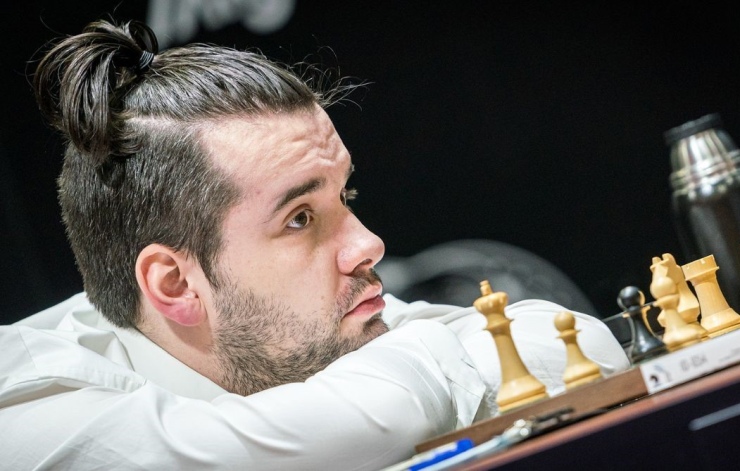 Russia’s second board, Ian Nepomniachtchi. PHOTO: David Llada
Russia’s second board, Ian Nepomniachtchi. PHOTO: David Llada
The second match was a fight to the death, where not a single draw was signed, and yet it ended in a tie as both teams scored three victories each. In a do-or-die situation, Wesley So showed his A-game and defeated Alexander Grischuk in a very interesting battle, imbalanced in terms of structure and material. Shankland, with Black, played and ambitious and risky move, 13…Ke7, leaving his King in the center. Black looked just fine, but Ian Nepomniachtchi maneuvered to open some files for his heavy pieces, and when he finally did the relatively exposed Black King fell in a deadly trap.
Goaryachkina opted for the Caro–Kann with Black, but the resulting position was as sharp as if she had played a Sicilian. It was a double-edged game with plenty of complications, but White had the upper hand and, when the dust settled, Carissa Yip emerged two pawns up in a simple endgame. On the sixth board, Polina Shuvalova was slightly worse in her game against Annie Wang, but the American player suddenly collapsed and allowed the white knight to came out from the corner and destroy Black’s position. Andrey Esipenko achieved a clear advantage (almost decisive at some point), but probably he should have solved his back rank problems with 29…Re8 first, before going for the kill. He didn’t do so and, as a result, Jeffery Xiong found some ingenious tricks that not only allowed him to save the game but gave him the full point.
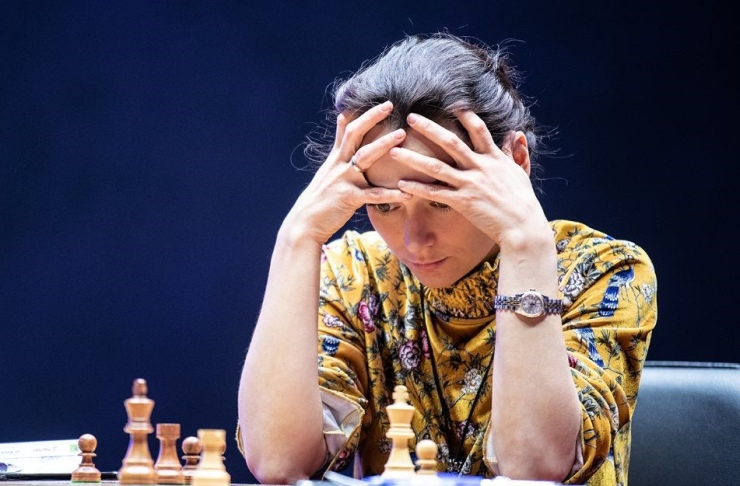 Alexandra Kosteniuk won the decisive game against the USA. PHOTO: David Llada
Alexandra Kosteniuk won the decisive game against the USA. PHOTO: David Llada
The hero of the day for the Russian team was Alexandra Kosteniuk. The Queen of Russian Chess scored her second win of the day, and both victories were decisive: the first one allowed Russia to win the match, and the second one secured the draw that promoted Russia into the Final against India.
Match 1: Russia – USA 3½:2½
Grischuk ½-½ So
Dubov ½-½ Shankland
Goryachkina 1-0 Zatonskih
Kosteniuk 1-0 Abrahamyan
Esipenko ½-½ Xiong
Shuvalova 0-1 Wang
Match 2: USA – Russia 3:3
So 1-0 Grischuk
Shankland 0-1 Nepomniachtchi
Yip 1-0 Goryachkina
Zatonskih 0-1 Kosteniuk
Xiong 1-0 Esipenko
Wang 0-1 Shuvalova
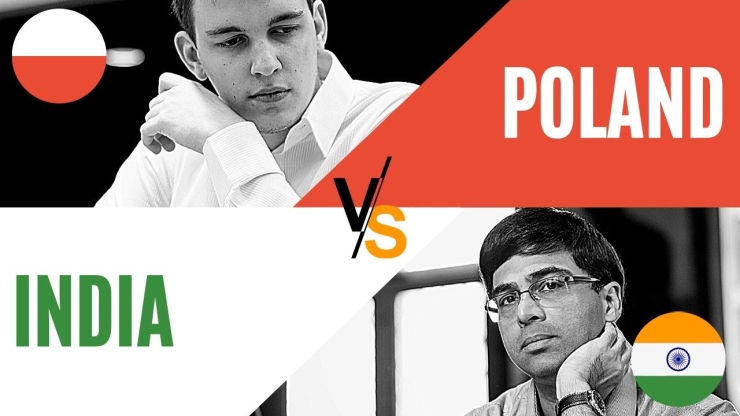
India beats Poland to become the first finalist of the Online Chess Olympiad. India’s rival will come out of the clash between Russia and the USA.
It wasn’t an easy match for the winners, who had to come from behind after losing 4-2 in the first round. Jan-Krzysztof Duda managed to out-prepare Vishy Anand on the black side of a Sicilian and came out of the opening with a solid positional advantage that he didn’t fail to convert. Vidit played very aggressively with black, resolutely advancing his h-pawn all the way to h3 and creating some problems to Radek Wojtaszek. However, after the Indian missed an interesting tactical solution (21…Rxe3) White contained the attack, the advanced pawn was captured, and the Polish GM took the whole point. India seemed to have good chances of tying the match thanks to their last two boards, where both Nihal Sarin and Divya Desmukh had better positions. But only Sarin managed to win his game, while Deshmukh fell into time trouble, ruined her little advantage and lost.
It is not easy to bounce back right after a defeat, but that’s exactly what India did in the second round of the day, winning on-demand to level the match. Poland decided to replace Wojtaszek for the second round, maybe with the hope to surprise the Indians and avoid Vidit’s preparation, so it was Grzegorz Gajewski who played on board two. Out of the opening, the position was about equal, but the black king was more exposed and that tends to be an important factor in rapid chess. Vidit played 18.f4, went for the kill, and scored the whole point. Humpy Koneru completely outplayed Monika Socko, and Harika Dronavalli managed to defeat Karina Cyfka in an endgame where her Bishop was stronger than Black’s knight. Vishy Anand took his revenge against Duda although by this time the match was already decided in India’s favor. The final score was 4½-1½ for India.
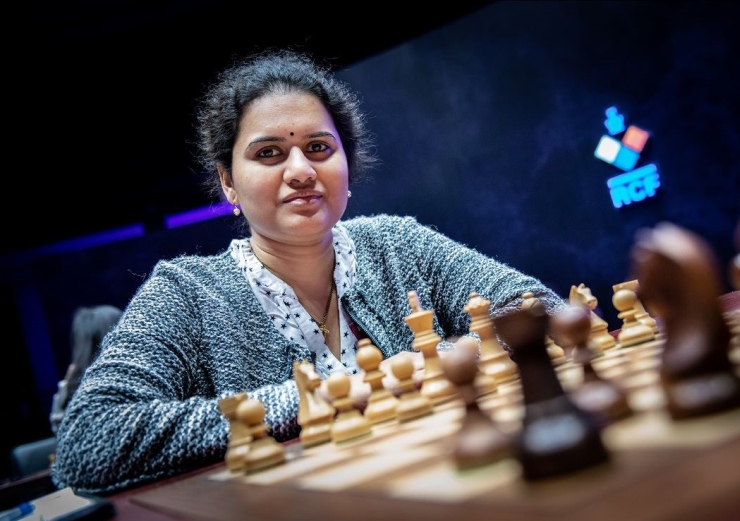 Koneru Humpy won the decisive Armageddon game against Poland Photo: David Llada
Koneru Humpy won the decisive Armageddon game against Poland Photo: David Llada
The match came down to the Armageddon tie-break where, like in the last of the quarterfinals played yesterday, Monika Socko had to represent the whole Polish team, fighting against Humpy Koneru for the spot in the finals. It was a fantastic clash between two experienced players and probably one of the best Armageddon games we have seen recently. Monika played aggressively – as the situation demanded – sacrificing a pawn right away to grasp the initiative. But Humpy kept her cool, immediately returned a pawn, gradually coordinated her pieces, and then exploited inaccuracies by Socko to score a well-deserved victory. Monika Socko showed once again great sportsmanship, smiling after the defeat and congratulating the winning Humpy.
India’s best result at a Chess Olympiads so far has been the third place in Tromsø 2014, but now the team is guaranteed a Silver Medal.
Match 1: India – Poland 2:4
Anand 0-1 Duda
Wojtaszek 1-0 Vidit
Koneru ½-½ Socko
Cyfka ½-½ Dronavalli
Nihal 1-0 Janik
Sliwicka 1-0 Divya
Match 2: Poland – India 1½: 4½
Duda 0-1 Anand
Vidit 1-0 Gajewski
Socko 0-1 Koneru
Dronavalli 1-0 Cyfka
Janik 1-0 Praggnanandhaa
Vantika ½-½ Sliwicka
Tiebreak: Socko – Koneru 0:1
